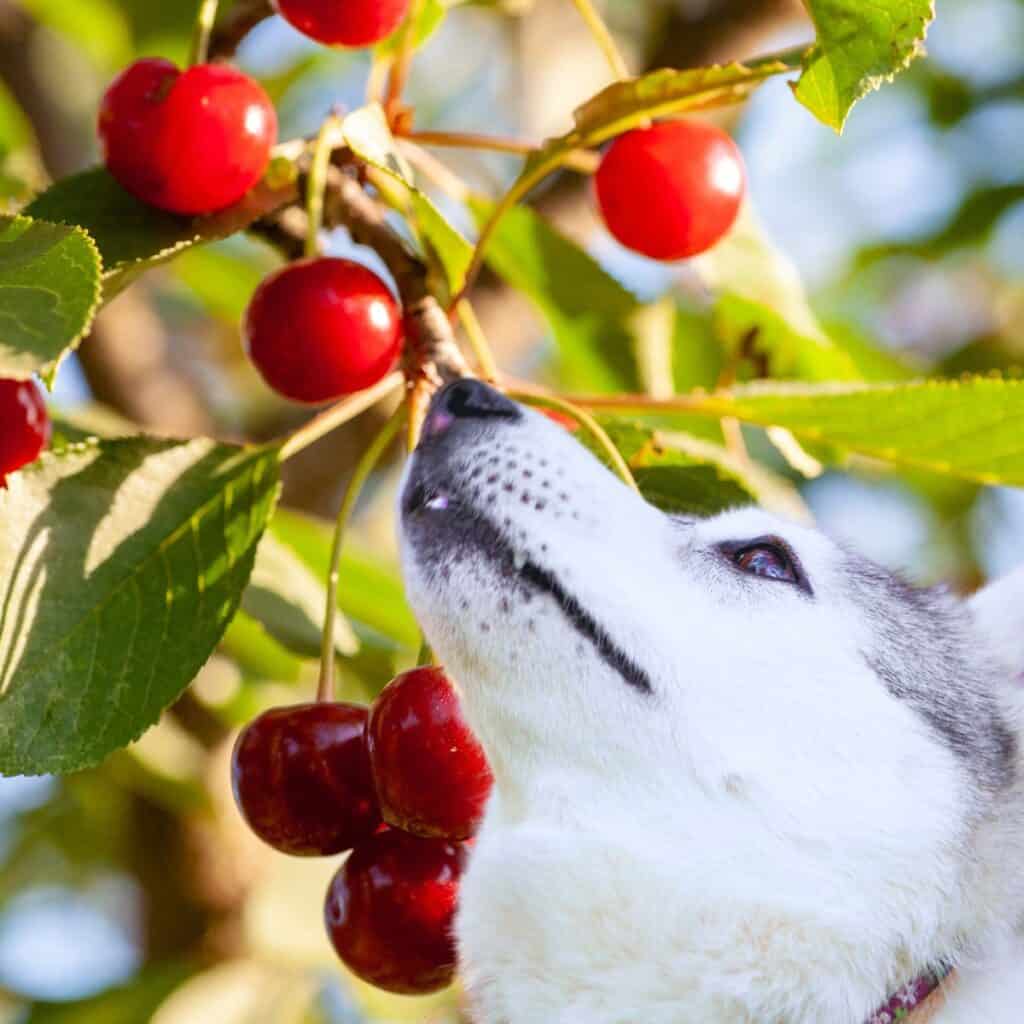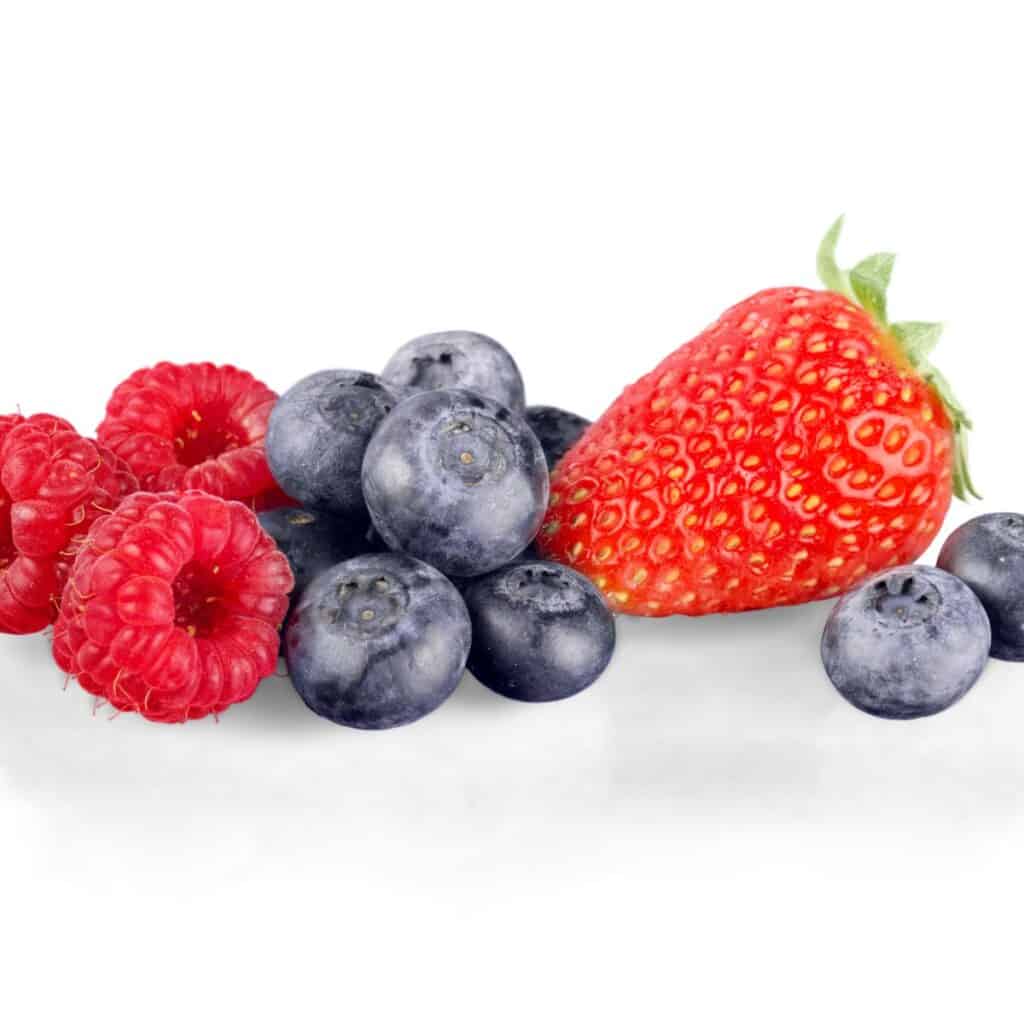Cherries and dogs—two things that hardly seem related at first glance. But hold your treat-filled paws, canine companions, because today we’re diving deep into the curious case of cherries and their impact on our four-legged friends. Picture this: a bright summer day and your mischievous pup eyeing that juicy, ruby-red fruit with an undeniable twinkle of temptation in their eyes. Now you find yourself in a bit of a fruity conundrum.

Are cherries a delectable delight or a dangerous disaster when it comes to our furry companions? Fear not, devoted dog lovers, because we’re about to unravel the truth behind this fruity frenzy. So, buckle up, grab a bowl of cherries for yourself (sorry, Fido, these are for humans), and join us on this sweet and savory adventure to answer the age-old question: Are cherries bad or good for dogs? (Spoiler alert: Yes but few with caution)

Can Dogs Eat Cherries?
Dogs are known to love fruits, and cherries are no exception. However, before feeding your furry friend cherries, it is important to understand the benefits and risks associated with cherries for dogs.
Benefits of Cherries for Dogs
Like many purportedly dangerous foods for dogs sometimes there are benefits if the food, Cherries are packed with vitamins and minerals that are beneficial for dogs. They contain antioxidants that can help boost the immune system and prevent diseases. Cherries are also a good source of fiber, which can aid in digestion and prevent constipation.
Furthermore, cherries contain melatonin, a hormone that regulates sleep. This means that feeding your dog cherries can help them sleep better at night.

Risks of Feeding Cherries to Dogs
While cherries are generally safe for dogs to eat, there are some risks associated with feeding dogs cherries. The main concern is the pit, which can pose a choking hazard or cause intestinal blockages if swallowed. Additionally, the pit contains cyanide, which can be toxic in large amounts.
Another risk is the high sugar content in cherries, which can lead to obesity, diabetes, and other health problems (especially concerning for our senior dogs!) if consumed in excess.
To avoid these risks, it is recommended to remove the pit and stem before feeding cherries to your dog. It is also important to limit the amount of cherries given to your dog and to avoid feeding them cherries on a regular basis.
In conclusion, while cherries can be a healthy and tasty treat for dogs, it is important to feed them in moderation and with caution.
How to Feed Cherries to Dogs
Preparing Cherries for Dogs
Before feeding cherries to dogs, it is important to prepare them properly. First, remove the stems and pits from the cherries. The pits contain cyanide, which can be toxic to dogs. Additionally, cherries with pits can pose a choking hazard to dogs. Once the cherries are pitted, they can be sliced into small pieces for easier consumption.

Serving Size for Dogs
While cherries can be a tasty treat for dogs, it is important to feed them in moderation. Too many cherries can cause stomach upset and diarrhea. The recommended serving size for dogs is one or two cherries per day, depending on the size of the dog. For smaller dogs, one cherry is sufficient, while larger dogs can have up to two cherries.
It is important to note that not all dogs may enjoy the taste of cherries. Some dogs may also have an allergic reaction to cherries, so it is important to monitor your dog closely after feeding them cherries for the first time.
In conclusion, while cherries can be a tasty treat for dogs, they should be fed in moderation and prepared properly to avoid any potential health risks.
Alternatives to Cherries
Fruits Dogs Can Eat
While cherries are not toxic to dogs, they can be risky due to the pits. If you want to give your furry friend a sweet treat, there are plenty of other fruits that are safe for them to eat. Here are some options:
- Apples: Cut them into bite-sized pieces and remove the seeds and core.
- Bananas: These are a great source of potassium and can be given as a treat or mixed into their food.
- Blueberries: These are high in antioxidants and can be given fresh or frozen.
- Mango: Remove the skin and pit and cut into small pieces.
- Watermelon: Remove the seeds and cut into small pieces.

Fruits Dogs Should Avoid
Not all fruits are safe for dogs to eat. Some can cause digestive issues or even be toxic. Here are some fruits to avoid giving to your furry friend:
- Grapes and raisins: These can cause kidney failure in dogs.
- Avocado: The pit and skin contain persin, which can be toxic to dogs.
- Citrus: The acid in citrus fruits can cause digestive issues.
- Persimmons: These can cause intestinal blockages in dogs.
- Tomatoes: While the flesh is safe, the leaves and stems contain solanine, which can be toxic.
Remember to always check with your veterinarian before introducing new foods into your dog’s diet.
Conclusion
In conclusion, the question of whether dogs can eat cherries is a bit of a mixed bag. While cherries themselves are not toxic to dogs, the pits and stems can be dangerous and potentially deadly. As such, it is recommended that dog owners err on the side of caution and avoid giving their furry friends cherries altogether.
That being said, if a dog does happen to eat a cherry or two, it’s unlikely to cause any serious harm. However, it’s important to keep an eye on them for any signs of discomfort or illness, such as vomiting or diarrhea.
Ultimately, while cherries may be a tasty treat for humans, they are not worth risking your dog’s health over. Stick to dog-friendly snacks like carrots, apples, and peanut butter, and save the cherries for yourself.
You may also want to learn about other foods your dog can and cannot eat:
Can I Share My Spicy Food with My Dog? Can Dogs Eat Jalapenos, Chipotles and Other Spicy Foods?
What Dog Treats Not to Give Your Dog: Four types of dog treats to avoid
Feeding Dog Cherries FAQ
Whether or not your dog likes cherries will depend on your individual dog but most dogs enjoy this juicy fruit similar to their enjoyment for blueberries, however, cherries should be fed with caution only a few at a time with pits, stems and leaves removed.
Your dog can have cherries with the skin and while cherries and the skin themselves are not toxic to dogs, the pits and stems can be dangerous and potentially deadly. As such, it is recommended that dog owners err on the side of caution and avoid giving their furry friends cherries altogether.
Looking to learn more about dogs and test your dog knowledge? Check out:
Dog Quiz: Test Your Dog Name Knowledge Learn about the most popular dog names and see if you can guess how they have changed throughout the years.
Dog Quiz: Dogfluencer quiz test your knowledge of the most popular dogs on Instagram
The Most Popular Pet Quiz test your knowledge about the most popular pets in America and certain states.

